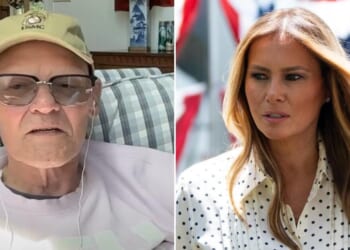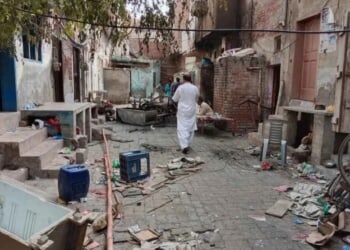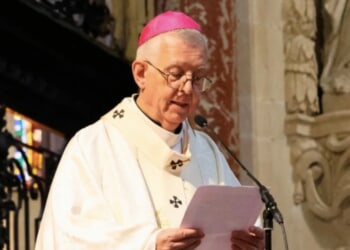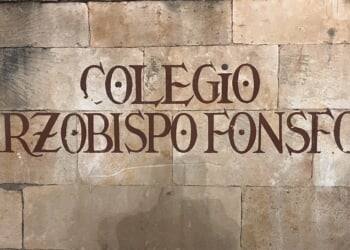Trump’s growing conflict with the narco republic of Venezuela may seem a sideshow compared with the potentially cataclysmic crisis in Ukraine, the Middle East, and the Indo-Pacific. But it’s taking priority for his America First policy, as reality sinks in that the only way to oust the criminally run regime threatening the U.S. in its own hemisphere is by force.
But Latin America is divided. At least eight countries are supporting the U.S. blockade.
A naval task force was ordered into the southern Caribbean last week with the primary objective of blocking drug trafficking operations by Venezuela’s Cártel de los Soles, named after the sun insignia on the shoulder patches of Venezuelan generals who have been filling the U.S. with cocaine, fentanyl, criminal gangs, and terrorists through waves of mass migrations unleashed by dictator Nicolás Maduro. (RELATED: Nicolás Maduro: Trump Must Oust the Illegitimate Venezuelan Dictator and Revive the Monroe Doctrine)
A 2,500-strong Marine Expeditionary Unit on board three powerful amphibious warfare vessels carrying some 40 helicopters and other vertical take-off and landing aircraft is clearly intended for an eventual capture and extraction of Maduro, for whom the Trump administration is offering a $50 million bounty.
The hope is that the military pressure, combined with the generous reward offers for Maduro, will entice his interior minister, Diosdado Cabello, and the defense minister, Padrino López, and other members of Venezuela’s high command to turn him over through a bloodless coup, opening the way for democratic government. In a direct appeal to Venezuela’s armed forces released on video, U.S. Secretary of State Marco Rubio said, “You are the only ones who can avoid a bloodbath.”
“I suspect that Trump is having hardcore secret negotiations with Maduro and his generals. At least part of the Venezuelan high command would love dearly to dump Maduro if the U.S. drops drug trafficking indictments against them,” says a former high-level CIA officer who was stationed in Caracas. (RELATED: US Intelligence Downplays Maduro Partnership With Tren De Aragua)
Trump tried backing a coup against Maduro during his previous administration, when the Venezuelan congress accused the budding dictator of violating the constitution. But the attempt failed due to a lack of military muscle. Army officers prepared to back congressional leader Juan Guaidó at the time were neutralized by Padrino, who penetrated the plot by pretending to go along with it as Cuban and Russian advisors protected Maduro.
According to former NSC chief John Bolton, White House proposals for U.S. military action were resisted at the Pentagon, which exhibited an institutional allergy towards intervening in Latin America. Then Defense Secretary Mark Esper proudly takes credit for rejecting Trump’s suggestions in his book, A Sacred Oath. It may be no coincidence that current Defense Secretary Pete Hegseth fired the head of the Defense Intelligence Agency last week.
But the extent to which Washington can rely on Venezuela’s military to carry the ball remains questionable. The regime’s ties to drug traffic are deep-rooted. Maduro’s predecessor, Hugo Chavez, was elected president in 1999 in a campaign financed by the Colombian narco terrorist organization FARC. His interior minister, Rodriguez Chacin, ran an arms-for-drugs trade with Colombian guerrillas, some of whom established bases in Venezuela.
Promotions to key security posts became conditioned on service to the cartel. Maduro appointed General Néstor Reverol as interior minister days after he was indicted by a U.S. federal court for using his position as drug czar to assist cocaine smugglers. Iran got in on the action. Maduro’s vice president, Tareck El Aissami, funneled millions of dollars in drug proceeds to Hezbollah accounts in Lebanon, according to his indictment by the U.S. Treasury Department.
The blockade initiated by the U.S. naval squadron reaching Venezuela this week, assisted by French frigates stationed in a nearby Caribbean island colony, has paralyzed drug shipments. Planes loaded with tons of cocaine aren’t taking off for fear of interception by the highly advanced Aegis air defense systems on the four U.S. destroyers patrolling off the coast, which interface with P-8 Poseidon surveillance planes overflying Venezuela 24/7.
At a further stage, U.S. warships could launch Tomahawk missile strikes on airfields, processing laboratories, warehousing facilities, and other narco trafficking infrastructure where drugs are piling up. The target list might be expanded to include military command and control centers, transport, communications facilities, and arsenals. (RELATED: Trump, Theodore Roosevelt, and US Naval Power)
“The U.S. could destroy months’ worth of revenues for the Venezuelan regime, which now makes about as much money from drugs as it gets from oil,” an exiled Venezuelan brigadier general and high-level ex-interior ministry official told The American Spectator.
Diminished incomes should prod some in the top brass to try to cash in on the U.S. reward offered for their boss. But breaking the tribal loyalties of Cártel de los Soles is not easy. They are bound as much by greed as fear of the Cuban advisors running the military counter-intelligence service DGCIM and Maduro’s security inner ring, who follow orders from Havana, where China holds increasing sway.
A negotiated solution allowing the regime to leverage a transition that lets Maduro go into a golden exile in Cuba, Nicaragua, or possibly Russia has been reportedly proposed by Vice President Delcy Rodríguez, whose brother presides over the rubber-stamp parliament.
The opposition is vulnerable to penetration. Exile sources report regime attempts to influence the inner circle of the octogenarian winner of last year’s elections, Edmundo González, who escaped to Spain when Maduro threatened to arrest him. His Madrid asylum was arranged by ex-Spanish president and Socialist leader José Luis Rodríguez Zapatero, who doubles as an international lobbyist, mediator, and troubleshooter for Maduro.
There were efforts to replace González’s vice president, the charismatic opposition leader María Corina Machado, with a military officer, according to the reports. Machado has survived the intrigues, but as the crisis drags on, regime rescue efforts could reach extreme proportions.
Comparisons are drawn between Maduro and Panama’s General Manuel Noriega, snatched from power by American paratroopers in 1989 to face drug charges in the U.S. But Noriega lacked the global network supporting Maduro, around whom the Latin American left is closing ranks.
Mexico’s president, Claudia Sheinbaum, has strongly condemned U.S. military moves on Venezuela, denying that the Cártel de los Soles exists. “I have seen no evidence to indicate that President Maduro is involved with drug cartels,” she said in official statements echoed by Colombian president Gustavo Petro, who has sent troops to join the Venezuelan army for “anti-drug operations” along the border, in a mock attempt to deflect U.S. accusations. (RELATED: Trump’s Strong-Arm Tactics Convince Mexico to Take Action Against Cartels)
Sheinbaum and Petro face their own U.S. investigations into ties with drug traffickers, as do a host of other Latin American socialist leaders working together through the Foro de São Paolo, a leftist coordinating and support network founded by Brazilian president Lula da Silva and Fidel Castro in the 1990s. That group’s propaganda machinery is kicking into high gear, with Lula’s chief foreign policy advisor declaring that “organized crime cannot be fought through unilateral actions.” (RELATED: Mexico’s Gun Case Backfires)
A semi-official association of 33 Latin American and Caribbean states (CELAC) — promoted by Mexico, Brazil, and Venezuela, excludes the U.S. but welcomes Chinese CCP representatives to annual meetings — has issued statements denouncing the U.S. for “threatening a zone of peace.” China’s foreign ministry has followed up with pledges to counter U.S. “gunboat diplomacy” in a region where a majority of nations are signed up to its Belt and Road Initiative. (RELATED: To Secure the Panama Canal, Reinstitute the Monroe Doctrine)
But Latin America is divided. At least eight countries are supporting the U.S. blockade, including Argentina, Uruguay, Paraguay, Ecuador, El Salvador, Guyana, and Trinidad and Tobago, the latter two of which border Venezuela and are offering to host U.S. bases.
If the Marines have to land to get Maduro, serious shooting can be expected. Russia may not be in a position to provide replacements or maintenance for the S-300 missile batteries, Su-30 jet fighters, and T-72 tanks it sold to Venezuela, which the U.S. could largely neutralize in a matter of hours. But there are tens of thousands of AK assault rifles and machine guns, Dragunov sniper rifles, RPGs, and most worryingly, Igla shoulder-fired SAM missiles and Iranian-produced Shahed 131 kamikaze drones scattered among elite military units and hard-core loyalist “Collectivos” of Maduro’s Bolivarian Militias. Cuban special forces called Black Wasps are also on the ground, as are trained Hezbollah fighters, while Colombian FARC and ELN guerrillas control large swathes of territory in the interior of Venezuela.
Maduro may try to use human shields. He has over 1,000 political prisoners that the psychopaths running his prison system could threaten to eliminate. U.S. Special Forces may need to plan a mass hostage rescue.
The Trump administration is weighing the risks. A half-baked compromise, leaving Chinese-backed communists and drug cartel interests in place, is hardly an acceptable outcome. Getting drawn into a Latin American quagmire, on the other hand, could play into the hands of major adversaries. But as geopolitical challenges mount elsewhere around the globe, securing America’s own hemisphere seems all the more urgent. (RELATED: China Poses a Severe Threat in Panama and Leaves the US With No Choice.)
During the early days of his first term, Trump endorsed a peace deal between the Colombian government and FARC, which is turning a staunch American ally into another far-left narco-state aligned with Venezuela. He was under the influence of Obama holdovers at the State Department and dazzled by the Nobel Peace Prize received by Colombian president Juan Manuel Santos for his deal negotiated in Cuba with Maduro’s mediation. Trump is unlikely to be hoodwinked this time around.
READ MORE from Martin Arostegui:
Trump Has Putin Where He Wants Him
The Kremlin Is Worried NATO Will Go After Putin’s Soft Underbelly





![Gavin Newsom Threatens to 'Punch These Sons of B*thces in the Mouth' [WATCH]](https://www.right2024.com/wp-content/uploads/2025/08/Gavin-Newsom-Threatens-to-Punch-These-Sons-of-Bthces-in-350x250.jpg)
![ICE Arrests Illegal Alien Influencer During Her Livestream in Los Angeles: ‘You Bet We Did’ [WATCH]](https://www.right2024.com/wp-content/uploads/2025/08/ICE-Arrests-Illegal-Alien-Influencer-During-Her-Livestream-in-Los-350x250.jpg)






